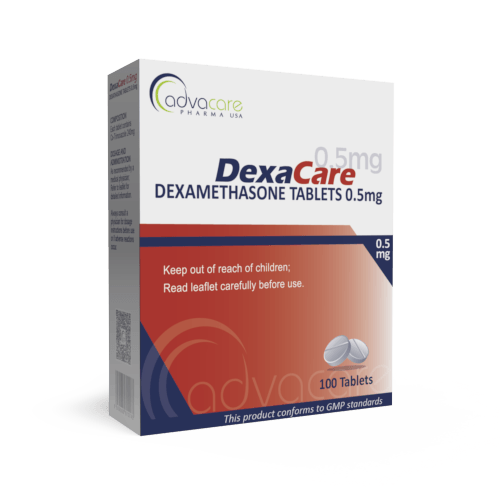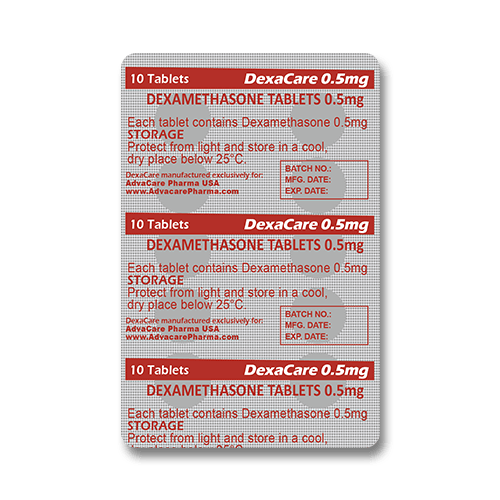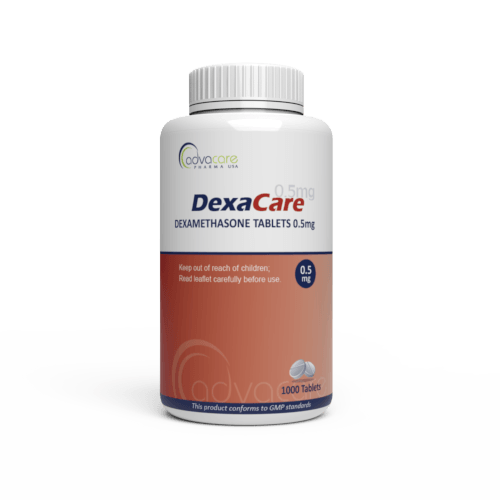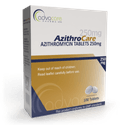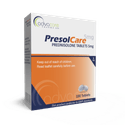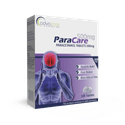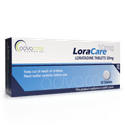- Home›
- Pharmaceuticals›
- Pharmaceutical Tablets›
- Dexamethasone Tablets
Dexamethasone Tablets
Dosage
Packaging
What is Dexamethasone?
Active Ingredients: Dexamethasone
Dexamethasone Tablets are a drug used to reduce inflammation. This medicine is commonly used to relieve symptoms associated with autoimmune conditions, such as arthritis, lupus, skin diseases, ulcerative colitis, psoriasis, or breathing disorders. It is also used to treat and prevent allergic reactions.
Dexamethasone can be administered as a local injection to treat inflammation related to arthritis, lupus, ulcerative colitis, and psoriasis or as eye drops to treat eye inflammation related to injury, shingles, acne, allergies, and uveitis. It can also be used in combination with other agents to relieve neuropathic pain and to treat and prevent eye infections.
Dexamethasone belongs to a class of drugs known as corticosteroids. Dexamethasone decreases the immune system's response, which reduces symptoms like itching, swelling, redness, and allergic reactions.
Corticosteroids bind to the glucocorticoid receptors to inhibit proinflammatory signals, such as vasodilation and capillary permeability, and promote anti-inflammatory signals. Lower doses produce an anti-inflammatory effect, while higher doses are immunosuppressive. Their actions at glucocorticoid receptors also mediate changes in gene expression, including the inhibition of certain inflammatory transcription factors and the promotion of anti-inflammatory genes, that produce effects that can last for days.
AdvaCare Pharma is a producer and exporter of Dexamethasone Tablets. We offer a wide range of high-quality and cost-effective medications that are available for distribution. Our supply chain is thoroughly vetted to ensure it meets health, safety, and environmental standards.
Why are we a trusted Dexamethasone manufacturer?
As a reputable Dexamethasone manufacturer, we are dedicated to ensuring that GMP guidelines and standards strictly apply to the manufacture of our entire range of 200+ pharmaceutical treatments in tablet dosage form.
AdvaCare Pharma is an American pharmaceutical company committed to the manufacture of high-quality, affordable pharmaceuticals for a global market. The extensive international network that we partner with includes pharmaceutical distributors, hospitals, pharmacies, and a variety of other medical institutions. Our vision is to manufacture Dexamethasone Tablets, and other quality-assured oral solid treatments, that get into the hands of those that need them most.
Uses
What is Dexamethasone used for?
It is used to relieve inflammation related to various conditions, particularly autoimmune conditions such as:
It can also be used to treat and prevent allergic responses. Dexamethasone is also used to treat nausea and vomiting during chemotherapy and to stimulate appetite in patients with cancer.
How are Dexamethasone Tablets used?
This medication is intended to be taken orally. It should be taken with food to prevent upset stomach.
What dose should be taken and for how long?
Adults Dosage may vary based on different medical indications:
- For the management of anti-inflammatory conditions and autoimmune disorders, the recommended initial daily dose is 0.75-9mg. Once there is a favorable response, the dosage should be lowered in small increments to the lowest effective dose.
- For the short-term management of an acute exacerbation of MS, the recommended treatment is 30mg once daily for 1 week, followed by 4-8mg every other day for 1 month. Chronic daily use of corticosteroids, like dexamethasone, is not recommended for the long-term treatment of MS relapses.
Children (> 1 month) For the management of anti-inflammatory conditions and autoimmune disorders, the recommended initial dose is 0.02-0.3mg/kg/day divided into 3 or 4 doses. Once there is a favorable response, the dosage should be lowered in small increments to the lowest effective dose.
Dosages may need to be increased during periods of stress (e.g., surgery, infection, trauma) or during exacerbations of condition. If there is no favorable response within a few days, treatment should be discontinued in favor of an alternative therapy. If treatment is discontinued after long-term therapy, a gradual decrease in dosage is recommended rather than abrupt discontinuation.
The dosages are based on medical condition, response to treatment, age, and weight. Refer to a doctor or pharmacist for further guidelines on dosage. Do not exceed what they advise.
Who can use Dexamethasone?
Dexamethasone can be administered to adults and children, but caution is advised for specific groups of patients.
Pregnant The teratogenic effects of corticosteroids have been demonstrated in different animal species. Studies of corticosteroid use during human pregnancy are inadequate and uncontrolled. Risk cannot be ruled out; dexamethasone should only be used during pregnancy if the potential benefit justifies any potential risk to the fetus.
Nursing Corticosteroids are excreted in human milk and have the potential to suppress growth, interfere with endogenous corticosteroid production, or produce other adverse effects. Due to the potential for serious adverse reactions in nursing infants, either nursing or dexamethasone should be discontinued, based on the importance of the drug to the patient.
Pediatric Corticosteroid use in pediatric patients has established safety and efficacy profiles and adverse events that are similar to those seen in adult populations. Pediatric patients treated with corticosteroids may experience a decrease in their growth velocity, even at low doses. Their growth should be monitored, and the potential negative growth effects of long-term treatment should be weighed against potential clinical benefits. To minimize the potential adverse growth effects of dexamethasone, pediatric patients should be titrated to the lowest effective dose.
Geriatric Studies did not include enough adults ≥ 65 years old to determine whether they respond differently than adults < 65 years old. Due to the increased risk of diabetes mellitus, fluid retention, and hypertension, treating geriatric patients with corticosteroids should be done with caution because of age-related decreases in hepatic, renal, and/or cardiac function and concomitant disease and drug therapy.
Other warnings
For patients with renal insufficiency, no dosage adjustment is necessary.
For patients with hepatic insufficiency, use of caution is advised.
Differences in thyroid status (e.g., hypothyroidism, hyperthyroidism) may impact the clearance of corticosteroids and may necessitate dosage adjustments.
In patients with congestive heart failure, hypertension, or renal insufficiency, corticosteroids may result in sodium retention (edema) and potassium loss that may require salt restriction and potassium supplementation. All corticosteroids increase calcium excretion. Corticosteroid use may be associated with left ventricular free wall rupture following recent myocardial infarction. Dexamethasone should be used with caution in those with certain cardiovascular conditions.
Corticosteroid use can result in reversible hypothalamic-pituitary adrenal (HPA) axis suppression. The discontinuation of treatment can result in cortisol insufficiency if withdrawn too quickly. These insufficiencies may persist for months after treatment discontinuation and hormone therapy should be reinstituted during times of stress.
Patients already receiving steroids may need higher doses of dexamethasone.
Patients taking corticosteroids are more susceptible to infections (viral, bacterial, fungal, protozoan, or helminthic) and infection-related complications in a dose-dependent manner. Some side effects of corticosteroid use may also mask signs of present infection.
Receiving live or live, attenuated vaccines (e.g., measles, mumps, rubella [MMR], polio, varicella [chickenpox]) is contraindicated in those receiving corticosteroids due to their suppression of antibody response. Killed or inactivated vaccines may be given, however they may not work as well, and the clinical responses to these cannot be predicted.
In patients who have not had chickenpox or measles, particular care should be taken to avoid exposure, as these viral infections can have more serious or even fatal outcomes.
Patients with active or latent peptic ulcers, diverticulitis, fresh intestinal anastomosis, and nonspecific ulcerative colitis may be at an increased risk of developing a perforation while taking corticosteroids.
Corticosteroid use may lead to the development of osteoporosis in patients of all ages. Those with an increased risk of osteoporosis should exercise caution when taking dexamethasone.
Prolonged use of corticosteroids should be discontinued gradually to mitigate the symptoms of cortisol insufficiency, such as myalgia, arthralgia, and malaise.
Side Effects
As with all pharmaceuticals, some unwanted effects can occur from the use of Dexamethasone Tablets.
Common side effects include, but may not be limited to:
- upset stomach
- heartburn
- headache
- dizziness
- insomnia
- restlessness
- depression
- anxiety
- acne
- increased hair growth
- easy bruising
- irregular or absent menstrual periods
Seek immediate medical attention if the following develop:
- rash
- vision problems
- persistent viral or bacterial infection
- muscle weakness
- seizures
- hypokalemia (muscle weakness or cramps, constipation, irregular heartbeats, increased thirst/urination)
- black or tarry stool or vomit that looks like coffee grounds
For a comprehensive understanding of all potential side effects, consult a medical professional.
If any symptoms persist or worsen, or you notice any other symptoms, please call your doctor immediately.
Precautions
Do NOT use Dexamethasone Tablets if:
- You are allergic to dexamethasone or any of its ingredients.
- You have a known infection or disease.
- You have recently been exposed to chickenpox or measles.
The use of dexamethasone during pregnancy is discouraged, as there is an increased risk of premature delivery. Little information is available on the use of dexamethasone while breastfeeding.
Consult with your doctor about any medications you are taking before your treatment with dexamethasone.
Discuss with a health practitioner before having a vaccine, as certain vaccines will not work as well.
Do not suddenly stop taking this medication, as withdrawal symptoms may occur.
Dexamethasone may weaken your immune system, which may increase the likelihood of getting an infection or worsening a present infection.
References
The efficiency and safety of dexamethasone for pain control in total joint arthroplasty
This meta-analysis aimed to evaluate the efficiency and safety of dexamethasone administration in total knee and hip arthroplasties. Studies from different databases were included in this research.
Four randomized controlled trials with 361 patients were included in this study. It was revealed that dexamethasone was associated with a lower opioid consumption at 12 hours (SMD = −0.245, 95% CI: −0.465 to −0.025, P = .029), 24 hours (SMD = −0.285, 95% CI: −0.505 to −0.064, P = .011), and 48 hours (SMD = −0.989, 95% CI: −1.710 to −0.267, P = .007).
The conclusion of this study is that dexamethasone could significantly reduce postoperative pain scores and opioid consumption within the 1st 48 hours following total joint arthroplasty (TJA).
You might be interested in...
Why AdvaCare Pharma?
As an industry leader, we are aware of our responsibility to provide affordable and sustainable solutions to improve healthcare worldwide.
